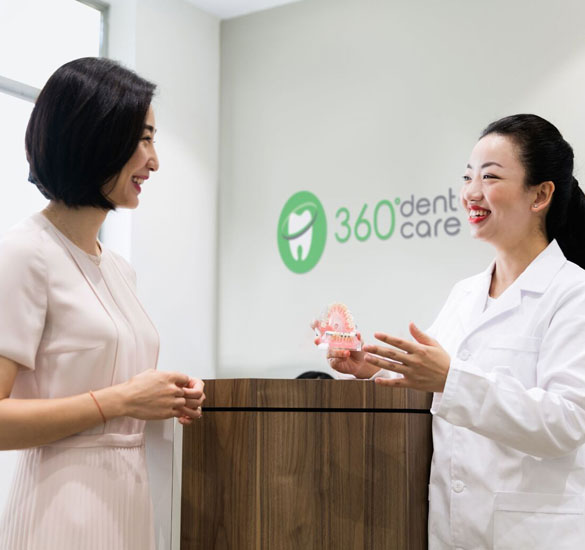A general scale and clean is required once every six months, however some people with special conditions may need to see their dentist more often. Schedule an appointment to find out what’s best for you.
Some problems won’t be noticeable to you at home, which is why it’s important to get regular check-ups (this is doubly true if you have a history of decay). For instance, gum disease often develops without people noticing and they may only act on it when they experience bleeding gums or severe discomfort.
There are some warning signs that you can spot yourself. Look out for:
- Gums that are swollen, tender, bleed when you brush or floss, or appear red (gums should be a pale pink colour)
- Oral pain, especially while chewing
- Persistent bad breath
- Loose teeth
- Consistent bad taste in mouth
- Teeth that are unusually sensitive to temperature.
If you notice any of these signs, contact us on 02 90512828 to schedule an appointment.
- Be sure to brush at least twice per day, using a gentle, circular motion. If you’ve just eaten, wait 30 minutes to brush, since highly acidic or starchy food can soften your enamel. Don’t forget to brush your tongue – bacteria love to accumulate here.
- Remove plaque by flossing at least once a day. Gently move the floss up and down the sides of each tooth, as well as around the gum line.
- After brushing and flossing, rinse with water. You can also use antibacterial or fluoride mouthwash (avoid giving fluoride rinses to children younger than six). Since different people can benefit from different rinses, speak with your dentist about which product is best for you.
- Replace your toothbrush every three to four months, or when you see the brush head is worn and bristly
- Avoid snacking on sugary or acidic food
- Swap sugary beverages like juice or fizzy drinks for tap water.
- Chew sugar-free gums, which can stimulate saliva production. Saliva is one of your mouth’s best natural defences against bacteria and plaque!
There is ample street parking available in front of the clinic.
X-rays allow the dentist to detect problems in areas not visible during visual examination, for example a cavity under an existing filling. During your first visit, we will conduct a general x-ray screening which needs to be updated annually or every two years.
Yes, but only for children under the Medicare Child Dental Benefits Schedule (CDBS)
For patients who are not eligible for the CDBS, Medicare does not provide any funding for dental, therefore we are not able to bulk bill.
Cavities and gum disease are the most common problems. Both can be prevented with regular brushing, flossing, and dental check-ups.
We treat children of all ages. They should have regular check-up once their first baby tooth has come through. Our dentists are particularly good with children and will make them feel at ease.
Yes, we open 9am – 5pm on Saturday to make sure we can treat any dental emergencies that may happen to you on weekends.
The main benefit of cleaning is healthier gums. During the clean, your dentist will remove most of the surface stains on the teeth, such as cigarette stains. However, the internal colour of teeth would not be changed. You should consider tooth whitening procedures if you want further improvements.
We offer a variety of ways to improve your smile, from bleaching to porcelain veneers. In as little as 60 minutes you can improve the colour of your teeth with Zoom in-office bleaching system. Ask one of our friendly staff which treatment is most suitable for you.


